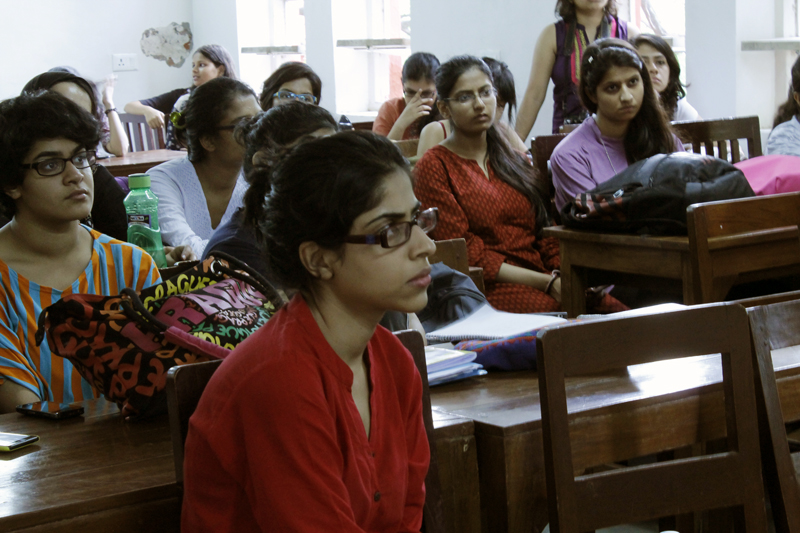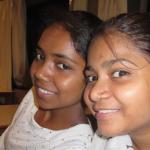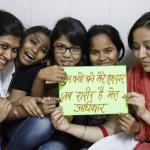FAT enters the gates and minds of LSR girls
A feminist going back to a place that introduced her to feminism is like visiting her place of birth. This is because the place taught me the true meaning of womanhood and what it entails. who I am – a woman. I received this wonderful opportunity when I was invited by the Political Science Department of Lady Shri Ram College for Women, my alma mater, to speak on “Women, technology and feminism”. Needless to mention, I was surprised, excited and nervous all at the same time. I was about to go back to my college and speak to them about my new adventures, explorations and revelations with feminism and technology at Feminist Approach to Technology (FAT), my recent work and hangout place.
I accepted their request to speak as a guest but also invited my colleagues (Asha, Rekha and Deepika), who have been doing some incredible work at FAT, to come with me and share their journey of becoming feminists, and using technology as a feminist medium rather than a mere tool to complete everyday tasks.
The day arrived. I couldn’t help pace up and down in the office going through my notes on feminist technology studies. I was worried of being judged by young girls for not being articulate and authentic enough. After all, I was one of them once upon a time and remembered how I had judged young speakers back then. Finally, we arrived at the college gates. We were received well and escorted to meet the faculty of the Political Science Department. They welcomed us and cordially discussed all about our work and roles at FAT. My colleagues and I chirped about how we work with young girls from urban slums at FAT’s Tech Center. We told them all about our Tech Center which has now emerged as a women-friendly-free space where girls come to learn computers, Internet, photography and filmmaking. These classes are interspersed with workshops on feminism, genders, patriarchy, women’s rights and other socially relevant issues.
Following this discussion, we were taken to the venue of the talk. It was a familiar class I had once attended lectures in. It was packed with young women. They all looked eager and excited. A friendly president from the Department introduced us. I initiated the talk by suggesting that I would prefer to make it a discussion as feminist technology is something that needs to be explored and not taught. There was a lively discussion with girls on why technology is gendered and how it can be made feminist. Innumerable questions were thrown at me. While I was able to catch some, I threw some back at them so they could explore the answers too. The most frequently asked question was, “why should we care if everyday technology is gendered if it’s serving our purpose?” I answered by raising few questions in return. What purpose is it that this everyday technology is fulfilling? Is it perpetuating violence against you in an overt and/or covert manner? Have you been able to exercise agency while using technology or have you been restricted in situations? Have you ever thought why there are many more men in IITs than women? Also wondered what if a technology was designed keeping women’s agency and freedom at its structure and not patriarchy and consumerism? This led to an excited discussion about how brothers, fathers and boyfriends live with the assumption that they are better in using and innovating technology than women. They also spoke of how harassment on Internet against women is so common than compared to men.
This discussion was taken over by my colleague Asha, who narrated her life story where she opted for her undergraduate degree in computer applications but never once got the chance to use a computer. This was because in her class, she was warned by men that her touch will destroy computers. But her life marked a significant change when she started working at FAT where technology was seen and used through a feminist lens. She stated that though the technology invention wasn’t feminist, its usage was which made her confident enough to tackle any computer application, software or hardware without a hint of self doubt. This discussion was taken forward by Deepika and Rekha showcasing their film ‘Apna Haq’ on lack of toilets in their communities.
The film had a tremendous impact on young girls watching the film. Deepika and Rekha spoke of how holding and using a camera gave them and several other girls a chance to speak on issues like menstruation, which are considered a taboo in their communities. They also spoke of their experience in making the film which empowered them to act rather than only speculate or feel vulnerable.
We ended the discussion by stating that feminism is all about equality and so is FAT and how proud we are of being FAT.
- By Shivani Rekha Gupta
Shivani is a Programme Associate at FAT, who handles research and advocacy.




